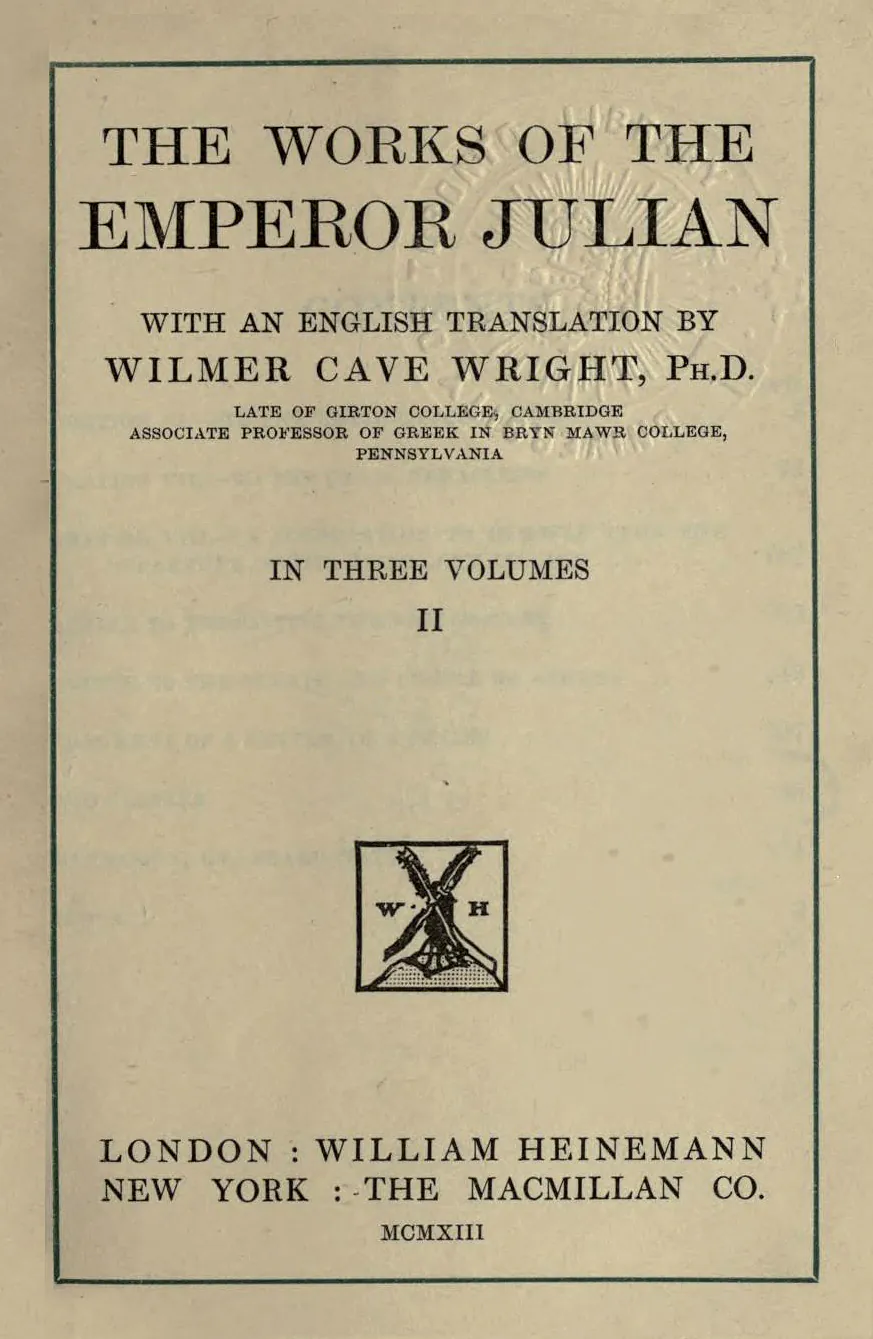[A]
περιφερομένη καὶ εἰς ὑμᾶς ἀκοὴ Χαιρωνέως ἀνδρὸς ἐκ τοῦ φαύλου γένους, ὁ δὴ λέγεται παρὰ τῶν ἀλαζόνων φιλόσοφον· οὗ δὴ καὶ αὐτὸς οὐκ ἐφικόμην μέν, ηὐξάμην δὲ ὑπὸ ἀμαθίας κοινωνῆσαι καὶ μετασχεῖν. ταῦτα οὖν ἐκεῖνος ἔφρασεν, ὡς ὁ Κάτων ἀπεκρίνατο μὲν οὐδέν, βοήσας δὲ μόνον οἷά τις ἔμπληκτος καὶ ἀνόητος ἄνθρωπος, Ὢ τῆς κακοδαίμονος πόλεως, ἀπιὼν ᾤχετο.
Μὴ δὴ θαυμάσητε, τοῦτο εἰ καὶ ἐγὼ νυνὶ πάσχω πρὸς ὑμᾶς,
[B]
ἀνὴρ ἀγριώτερος ἐκείνου καὶ θρασύτερος τοσούτῳ καὶ αὐθαδέστερος, ὅσον οἱ Κελτοὶ Ῥωμαίων. ὁ μὲν γὰρ ἐκεῖσε τεχθεὶς ἐγγὺς ἦλθε γήρως ἅμα τοῖς πολίταις τρεφόμενος· ἐμοὶ δὲ Κελτοὶ καὶ Γερμανοὶ καὶ δρυμὸς Ἑρκύνιος ἔμελεν ἄρτι πρῶτον εἰς ἄνδρας τελοῦντι, καὶ διέτριψα πολὺν ἤδη χρόνον, ὥσπερ τις κυνηγέτης ἀγρίοις ὁμιλῶν καὶ συμπλεκόμενος θηρίοις,
[C]
ἤθεσιν ἐντυγχάνων οὔτε θοπεύειν οὔτε κολακεύειν εἰδόσιν, ἁπλῶς δὲ καὶ ἐλευθέρως ἐκ τοῦ ἴσου πᾶσι προσφέρεσθαι. γέγονεν οὖν μοι μετὰ τὴν ἐκ παίδον τροφὴν ἥ τε ἐν μειρακίοις ὁδὸς διὰ τῶν Πλάτωνος καὶ Ἀριστοτέλους λόγων οὐδαμῶς ἐπιτηδείων δήμοις ἐντυγχάνειν οἰομένοις ὑπὸ τρυφῆς εὐδαιμονεστάτοις1ἐπιτηδείων—οἰομένοις—εὐδαιμονεστάτοις suggests, ἐπιτηδείῳ δήμοις ἐντυγχάνειν καὶ ὑπὸ τρυφῆς εὐδαιμονεστάτῳ MSS. εἶναι, ἥ τε ἐν ἀνδράσιν αὐτουργία παρὰ τοῖς μαχιμωτάτοις καὶ θυνικωτάτοις τῶν ἐθνῶν, ὅπου τὴν γαμηλίαν Ἀφροδίτην καὶ τὸν μεθυδότην Διόνυσον γάμου τε ἕνεκα καὶ παιδοποιίας οἴνου τε ὁπόσης ἑκάστῳ δυνατὸν πόσεως ἴσασι μόνον.
[D]
ἀσέλγεια δ ̓ οὐκ ἔστιν ἐν τοῖς θεάτροις οὐδὲ ὕβρις, οὐδὲ ἕλκει τις εἴσω τῆς σκηνῆς τὸν κόρδακα.
Λέγεταί τοι μικρῷ πρόσθεν ὡς ἐνθένδε ἐκεῖσέ τις Καππαδόκης φυγάς, ἐν τῇ παρ ̓ ὑμῖν τραφεὶς πόλει παρὰ τῷ χρυσοχίῳ· γνωρίζετε δήπουθεν ὃν λέγω· μαθὼν ὅπου καὶ ἔμαθεν, ὡς οὐ δέον ὁμιλεῖν γυναιξί, μειρακίοις δ ̓ ἐπιχειρεῖν, οὐκ οἶδα ὁπόσα ἐνθάδε δράσας καὶ παθών,
[A]
If any rumour has come round, even to your ears, of the man of Chaeroneia,2Plutarch. who belongs to that worthless class of men who are called by impostors philosophers, – I myself never attained to that class though in my ignorance I claimed to be a member of it and to have a part in it, – well he, as I was saying, related that Cato answered not with a word, but only cried aloud like a man stricken with madness and out of his senses, “Alas for this ill-fated city!” and took himself off.
Therefore do not be surprised if I now feel towards you as I do,
[B]
for I am more uncivilised than he, and more fierce and headstrong in proportion as the Celts are more so than the Romans. He was born in Rome and was nurtured among the Roman citizens till he was on the threshold of old age. But as for me, I had to do with Celts and Germans and the Hercynian forest3cf. Caesar, Gallic War, 6. 24. from the moment that I was reckoned a grown man, and I have by now spent a long time there, like some huntsman who associates with and is entangled among wild beasts.
[C]
There I met with temperaments that know not how to pay court or flatter, but only how to behave simply and frankly to all men alike. Then after my nurture in childhood, my path as a boy took me through the discourses of Plato and Aristotle, which are not at all suited for the reading of communities who think that on account of their luxury they are the happiest of men. Then I had to work hard myself among the most warlike and high-spirited of all nations, where men have knowledge of Aphrodite, goddess of Wedlock, only for the purpose of marrying and having children, and know Dionysus the Drink-Giver, only for the sake of just so much wine as each can drink at a draught.
[D]
And in their theatres no licentiousness or insolence exists, nor does any man dance the cordax on their stage.
A story is told of them that not long ago a certain Cappadocian was exiled from here to that place, a man who had been brought up in your city in the house of the goldsmith – you know of course whom I mean, – and had learned, as he naturally did learn there, that one ought not to have intercourse with women but to pay attention to youths. And when, after doing and suffering here I know not what,
EN translation: Wilmer Cave Wright, 1913
LEARN MORE
Place your mouse over a term to see corresponding popup from Wikipedia.
ALL PAGES

| Title | London: The Works of the Emperor Julian, Volume II/III |
| Publisher | London: William Heinemann |
| Year | 1913-23 |
| Pages | 416-511 pp. [vol. II: 538 pp.] |
| Translation | Wilmer Cave Wright. PhD |
| Editors | T.E. Page and W.H.D. Rouse |


